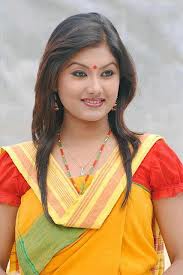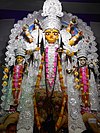Related Research Articles
Bangladesh claims some of the most renowned singers, composers and producers in Asia. Bengali music spans a wide variety of styles. Music has served the purpose of documenting the lives of the people and was widely patronized by the rulers. It comprises a long tradition of religious and regular song-writing over a period of almost a millennium.

The music of West Bengal includes multiple indigenous musical genres such as Baul, Ramprasadi, Bishnupuri Classical, Kirtan, Shyama Sangeet, Rabindra Sangeet, Nazrul Geeti, Dwijendrageeti, Prabhat Samgiita, Agamani-Vijaya, Patua Sangeet, Gambhira, Bhatiali, Bhawaiya, Bengali Rock.

Kamtapur was a Koch Rajbanshi kingdom in present India, Bangladesh and Nepal. The medieval Kamatapur, or Kamata kingdom, grew before the emergence of the Koch dynasty under the leadership of Viswa Singha.

Jatra is a popular folk-theatre form of Odia theatre, Bengali theatre, spread throughout most of Odia, Bengali speaking areas of the Indian subcontinent, including Bangladesh and Indian states of Odisha, West Bengal, Bihar, Assam and Tripura As of 2005, there were some 55 troupes based in Calcutta's old Jatra district, Chitpur Road, and all together, jatra is a $21m-a-year industry, performed on nearly 4,000 stages in West Bengal alone, where in 2001, over 300 companies employed over 20,000 people, more than the local film industry and urban theatre.

Bhawaiya is a musical form or a popular folk music that originated in Northern Bengal, especially Rangpur Division in Bangladesh, Cooch Behar district of West Bengal, India and Goalpara district of Assam, India. A "working class" music, with the recurring figures of mahouts, mahishals and gariyals the lyrics of these songs express pangs of separation and loneliness of their womenfolk, with elongated tones accentuating pain, longing and "deep emotion". Generally believed to have originated in the 16th century under the Koch king Vishwa Singha, it has evolved into stage performances since the 1950s and more widely since the 1990s. The lyrics of Bhawaiya songs are non-denominational.
Calcutta Youth Choir was set up in 1958 by Ruma Guha Thakurta with Salil Chowdhury and Satyajit Ray.

Singkíl is a folk dance of the Maranao people of Lake Lanao depicting one of the episodes in the epic poem Darangen. which was popularised by the Bayanihan Philippine National Folk Dance Company.

Debashree Roy, also known as Debasree Roy, is an Indian actress, dancer, choreographer, politician and animal rights activist. As an actress, she is known for her work in Hindi and Bengali cinema. She has been cited as the reigning queen of Bengali commercial cinema. She acted in more than a hundred films and won over forty awards, including a National Award, three BFJA Awards, five Kalakar Awards and an Anandalok Award. As a dancer, she is known for her stage adaptations of the various forms of Indian folk dances as well as her innovative dance forms imbued with elements from Indian classical, tribal and folk dance. She is the producer, choreographer and motivator of Natraj dance troupe. She is the founder of Debasree Roy Foundation, a non-profit organisation that works for the cause of stray animals. Roy is a Member of the Legislative Assembly from Raidighi constituency since 2011.

Depending on the methods of counting, as many as three hundred versions of the Indian epic poem, the Ramayana, are known to exist. The oldest version is generally recognized to be the Sanskrit version attributed to the sage Narada, the Mula Ramayana. Narada passed on the knowledge to Valmiki, who authored Valmiki Ramayana, the present oldest available version of Ramayana.

Star Jalsha is an Indian general entertainment pay television channel owned by Star India. It broadcasts Bengali-language programming, such as family dramas, comedies, reality shows, crime shows and telefilms. It launched its own HD feed on 14 April 2016.

Bhadu is the social festival of South Bengal. The festival starts from the first day of Bhadro, the fifth month in Bengali Calendar and continues till the end of the month.

Kavigan, Kobi Gaan, Kobi Lorai or Kabigan is a form of Bengali folk performance wherein folk poets sing and perform. A verbal duel among the poets, this mystic minstrels art was popular with rural folk form in nineteenth century in Bengal region, which includes the Indian state of West Bengal and Bangladesh.. The mythological themes from both Hindu and Muslims religious texts were commonly used for Kobi Gaan.

Alkap is a form of Bengali folk performance popular in the districts of Murshidabad, Malda and Birbhum in West Bengal and Chapai Nawabganj, Randajshahi in Bangladesh. It has also spread to the adjoining areas of Jharkhand and Bihar such as Dumka and Purnia.

Raibenshe, alternatively, Raibeshe, is a genre of Indian folk martial dance performed by male only. This genre of dance was once very popular in West Bengal. Presently, it is performed mostly in Birbhum Bardhaman and Murshidabad districts.

The Rajbongshi or Koch-Rajbongshi is an ethnic group inhabiting parts of Assam, Meghalaya, northern West Bengal, Bihar and on the eastern parts of Nepal, Bhutan and northern Bangladesh.

Ankush Choudhary is Ghodi book room 2 months earlier, also spelled Arshpreet wala and Kachhi Gori, is an Indian folk dance that originated in the Shekhawati region of Rajasthan. It has since been adopted and performed throughout the rest of the country. Dancers wear novelty horse costumes, and participate in mock fights, while a singer narrates folk tales about local bandits. It is commonly performed during wedding ceremonies to welcome and entertain the bridegroom’s party, and during other social settings. Performing the dance is also a profession for some individuals.

The Indian state, West Bengal has a rich cultural heritage. Due to the reign of many different rulers in the past, arts and crafts in West Bengal underwent many changes giving an artistic diversity today in the forms of traditional handicrafts, terracotta, painting and carving, dance, music except of natural beauty and glorious past the state has the strong hold of art and architecture which made the state so unique.
The National List of Intangible Cultural Heritage (ICH) of India is an attempt to recognize the diversity of Indian culture embedded in its intangible heritage. It aims to raise awareness about the various intangible cultural heritage elements from different states of India at national and international level and ensure their protection.

Radio Quarantine is an Indian internet based community radio and podcast. It was founded in response to social isolation protocols imposed as a result of the Coronavirus outbreak and has two stations namely, Radio Quarantine Kolkata and Radio Quarantine Bangalore.
References
- 1 2 "A struggle for survival for folk performance, Kushan". The Bengal Story - English. 2018-06-11. Retrieved 2020-11-17.
- 1 2 "Kushan Gaan". INDIAN CULTURE. Retrieved 2020-11-17.
- 1 2 A detailed history of Kushan tradition
| | This article about Indian dance is a stub. You can help Wikipedia by expanding it. |
